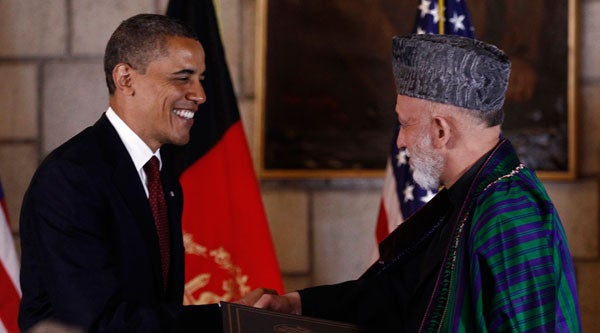|
May 4, 2012
Despite questions over U.S.-Afghan pact, Stanford professor remains optimistic
Erik Jensen argues that staying the course will have positive outcomes for generations of Afghans to come. By Sarina Beges

U.S. President Barack Obama and Afghan President Hamid Karzai shake hands after signing the Strategic Partnership Agreement at the Presidential Palace in Kabul, May 2, 2012. (Photo: Kevin Lamarque / Reuters) President Barack Obama's trip to Afghanistan this week to sign the Strategic Partnership Agreement reaffirmed America's commitment to secure and rebuild the country beyond the 2014 troop withdrawal. The stakes are high as the United States embarks on an ambitious and expensive 10-year plan that the American public may be reluctant to support after a decade of war. But Stanford law Professor Erik Jensen argues that staying the course will have positive outcomes for generations of Afghans to come.
Jensen just returned from Afghanistan where, he says, the streets of Kabul are bustling with life, business and a renewed sense of pride. Working on rule-of-law issues in Afghanistan since the fall of the Taliban in the mid-1990s, Jensen sees these small changes as signs of progress in a country that has experienced decades of conflict.
Jensen, an affiliated faculty member at the Center on Democracy, Development and the Rule of Law at Stanford's Freeman Spogli Institute, has piloted a program to train Afghan lawyers at the American University of Afghanistan. The project has gained the trust of Afghanistan's political, judicial and law enforcement officials, and is a model for innovation in legal education.
Jensen discusses U.S. relations with Afghanistan and the legal education project that has required an adjustment of his own career.
Why is the Strategic Partnership Agreement important?
It is a framework for President Obama to ensure Afghans that America will not pull out lock, stock and barrel in 2014. Afghans are palpably apprehensive about the pullout in 2014. President Obama's trip to Afghanistan to sign this strategic partnership in the presence of President Karzai is a very important signal to Afghans that there is a future to the relationship beyond 2014.
What will happen under the agreement?
What is anticipated is a drastic drawdown on troops and security contractors, but not a pullout. The budget is estimated at $4 billion per year, which might sound like a lot. But the budget currently tops $100 billion. Drastic reductions in funding create opportunities for institutional change. There have been comparisons to the American presence on the Korean Peninsula, which is not inexpensive but you can see a security benefit with relatively modest amounts of money.
How is Afghanistan becoming a stronger, more stable country?
Despite negative publicity that Afghanistan has attracted in the international press, I have seen qualified teachers showing up to teach students who are hungry to learn. On my most recent trip, I drove through Massoud Circle in the heart of Kabul and people handed out photos of fallen Afghan soldiers who had stood up and defended their country against a recent insurgent attack. There was a sense of pride among Afghans. Afghan security forces have been in charge of security in Kabul for several years, and I think this is a really modest but positive sign.
There are a number of Afghans who have put their backs into building democratic institutions. It hasn't all gone that well but they remain committed. The American public owes it to itself and the Afghan people to imagine alternatives and to work hand-in-hand with Afghans to ensure that systems are in place to give Afghans a chance.
What is the Afghanistan Legal Education Project (ALEP)?
Stanford law students and I started this project at the American University of Afghanistan five years ago to build a law curriculum that leads to a legal certificate. The goal of ALEP is to produce capable graduates who can think, write and behave as professional lawyers early on in their careers before they are stuck in sub-optimal institutions where they develop habits that are not good.
How is ALEP strengthening rule of law in Afghanistan?
To date, the ALEP team has written four legal textbooks critically analyzing the laws of Afghanistan. Another two will be released in the next year. As Afghanistan builds its economy and justice systems, it is essential to have lawyers with sound training in commercial and criminal law. A course taught at the American University of Afghanistan introduces students to formal and informal systems of dispute resolution and emphasizes legal pluralisms in customary, Islamic and national laws. Afghan students puzzle through how they can strengthen rule of law, generating recommendations for interventions to reform and change the system. Ethics courses are an integral part of the curricula to encourage students to act ethically and responsibly.
Do you remain hopeful for Afghanistan as you look a decade into the future?
The empirical side of me knows the odds of short- or even medium-term success in Afghanistan, but I'm also inspired by the people I have worked with in Afghanistan. The Afghan vision of a better future is there, and those Afghans deserve our support as we move forward. It is a different world in Kabul today than where it was when the Taliban fell.
One question to ask is: To what extent have the changes in Kabul today become so much a part of life for Afghans that they will fight for greater openness, for television shows they find interesting, for a media that is a growing presence in Afghanistan? I am not sure the clock can be turned back.
Sarina Beges is the program manager for the Center on Democracy, Development and the Rule of Law.
-30-
|